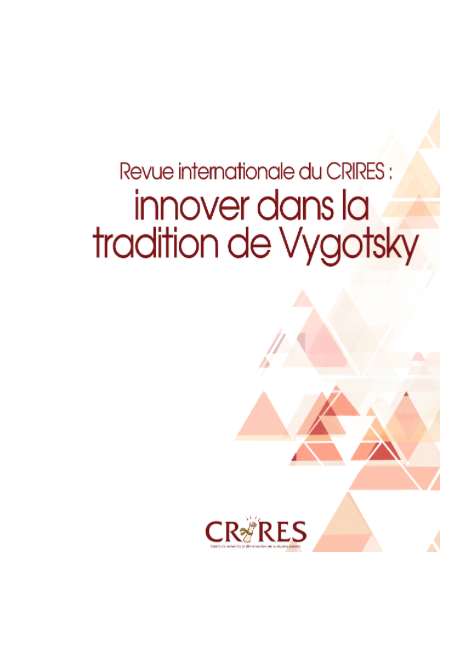CONTRIBUTION À LA COMPRÉHENSION DU CONCEPT DE LA PARTICIPATION : UNE ANALYSE LEXICOMÉTRIQUE
DOI:
https://doi.org/10.51657/ric.v6i1.51439Keywords:
participation, lexicometry, activity theory, students, engagementAbstract
The main purpose of the paper is to explore the use of the concept of participation among scholars affiliated with the réseau PÉRISCOPE (Plateforme Échange, Recherche et Intervention sur la SCOlarité : Persévérance et réussitE), advocates of the activity theory (Engeström, 1987-2015 ; Vygotsky, 1978) via a transversal analysis. Scientific literature offered via this research network database between 2015 and 2019 constitute the datas from which agents’ activity is examined in their own context (class, school, community, etc.). In order to identify the different uses and understandings of the concept of the participation among these scholars, a lexicometric analysis was performed. This methodology is actually based on linguistic and is wielded by different historical approaches as history of ideas, history of concepts and discourse analysis. It appears that the notion of students’ engagement stands out in the corpus, which supports the scientific interpretation of the notion of participation that gives way to engagement. Moreover, the réseau PÉRISCOPE scientific activities generated a renewed interest for specific themes of research such as the participation, school dropout, school perseverance, and academic results. Our analysis suggests also that the scientific literature on participation tends to have a peculiar focus on teens. Finally, actions associated with students contribute to nuance and to detail scholars’ understanding of the concept of participation in educational context. Linguistic associations’ analysis of this corpus constitutes a key instrument for a better insight into the use and mobilization of the concept of the participation.
References
Arievitch, I. M. (2008). Exploring the Links between External and Internal Activity from a Cultural-Historical Perspective. Dans Van Oers, B. et al. (Eds), The Transformation of Learning : Advances in Cultural-Historical Activity Theory. Cambridge University Press.
Bévir, M. (1999). The Logic of the Hsitory of Ideas. Cambridge University Press.
Bonin, E. et Dallo, A. (2003). Hyperbase et Lexico 3, outils lexicométriques pour l’historien. Histoire & Mesure, XVIII (3-4). https://doi.org/10.4000/histoiremesure.840
Engeström, Y. (1987-2015). Learning by Expanding: An Activity Theoretical Approach to Developmental Research. Orienta-Konsultit.
Guilhaumou, J. (2000). De l’histoire des concepts à l’histoire linguistique des usages conceptuels. Genèse. Sciences sociales et histoire, 38, 105-118.
Guilhaumou, J. (1986). L’historien du discours et la lexicométrie : Étude d’une série chronologique : le « Père Duchesne » d’Hébert (Juillet 1793 – mars 1794). Histoire et Mesure, 1-3-4, 27-46.
Heiden, S., Magué, J-P., Pincemin, B. (2010). TXM : Une plateforme logicielle open-source pour la textométrie – conception et développement. Dans Bolasco, S., Chiari, I., et Giuliano, L. (Dir.), Proc. Of 10th International Conference on the Statistical Analysis of Textual Data – JADT 2010 (Volume 2, p. 1021-1032). Edizioni Universitarie di Lettere Economia Diritto.
Koselleck, R. (1990). Le futur passé : contribution à la sémantique des temps historiques. Éditions de l’École des Hautes études en sciences sociales.
Lafon, P. (1980). Sur la variabilité de la fréquence des formes dans un corpus. Mots, 1, 127-165. https ://doi.org/10.3406/mots.1980.1008
Lafon, P. (1983). L’inventaire des segments répétés d’un texte. Mots, 6, 161-177. https ://doi.org/10.3406/mots.1983.1101
Lamalle, C., Martinez, W., Fleury, S., Salem, A., Fracchiolla, B., Kuncova, A. et Maisondieu, A. (2003). Lexico 3, outil de statistique textuelle : Manuel d’utilisation. Version 3.41. Laboratoire SYLED - CLA2T, Université de la Sorbonne nouvelle (Paris 3). https://lexi-co.com/ressources/manuel-3.41.pdf
Lave, J. (1997). The culture of acquisition and the practice of learning. Dans D. Kirshner et J. A. Whitson (Eds.), Situated cognition. Social, semiotic, and psychological perspectives (p. 17–35). Lawrence Erlbaum.
Lebart, L. et Salem, A. (1994). Statistique Textuelle. Université de la Sorbonne nouvelle. http://lexicometrica.univ-paris3.fr/livre/st94/st94-tdm.html
Lemercier, C. et Zalc, C. (2008). Méthodes quantitatives pour l’historien. La Découverte, coll. Repères – Histoire.
Louviot, M. (2019). La participation des enfants à l’école sous le prisme des droits de l’enfant. Éducation et socialisation : les cahiers du CERFEE, 53. https://doi.org/10.4000/edso.7297
Nadeau, S. (2018a). Dossier sur l’engagement des élèves/étudiant·es dans la classe ou l’école : recherches québécoises. Série Leviers PRS, (2-1), 1-22.
Nadeau, S. (2018b). Études réalisées ailleurs au Canada sur l’engagement des jeunes dans la classe ou l’école. Série Leviers PRS, (2-2), 1-15.
Nadeau, S. (2018c). Contrer le décrochage scolaire : quatre pistes d’action. Série Leviers PRS.
Pincemin, B. (2018). Sept logiciels de textométrie, HAL.
Sfard, A. (2003). Balancing the unbalanceable: The NCTM standards in the light of theories of learning. Dans J. Kilpatrick, W. G. Martin, et D. Schifter (Eds.), A research companion to the principles and standards for school mathematics. NCTM.
Sfard, A. (2008). Thinking as communicating. Human development, the growth of discourses, and mathematizing. Cambridge University Press.
Skinner, Q. (1978). The Foundations of Modern Political Thought. 2 volumes. Cambridge University Press.
Tisdall, E.K.M. (2015). Children and young people’s participation: a critical consideration of Article 12. Dans Wandenhole, W., Desmet, E., Reynaert D. et Lembrechts, S. (Eds.), Routledge international handbook of children’s rights studies (p. 185-200). Routledge.
Van Oers, B. (2008). Learning and Learning Theory from a Cultural-Historical Point of View. Dans Van Oers, B. et al. (Eds). The Transformation of Learning: Advances in Cultural-Historical Activity Theory. Cambridge University Press.
Vygotsky, L.S. (1978). Mind in society: The development of higher psychological processes. Harvard University Press.
Downloads
Published
Issue
Section
License
Copyright (c) 2022 Maryliz Racine, Stéphane Allaire

This work is licensed under a Creative Commons Attribution-NonCommercial-NoDerivatives 4.0 International License.

